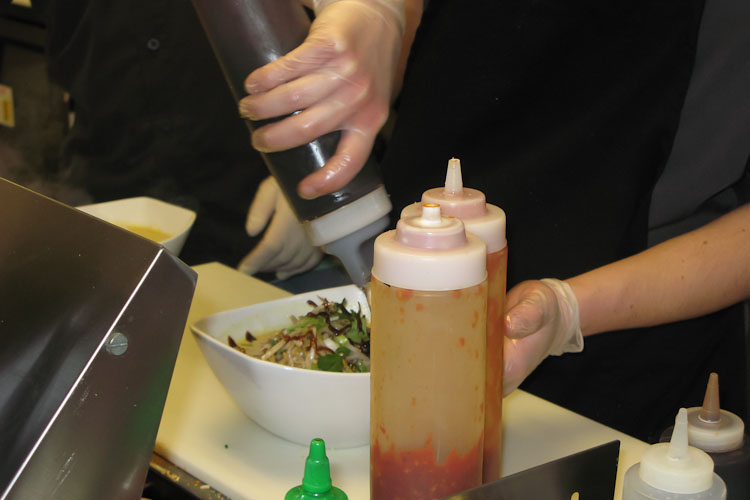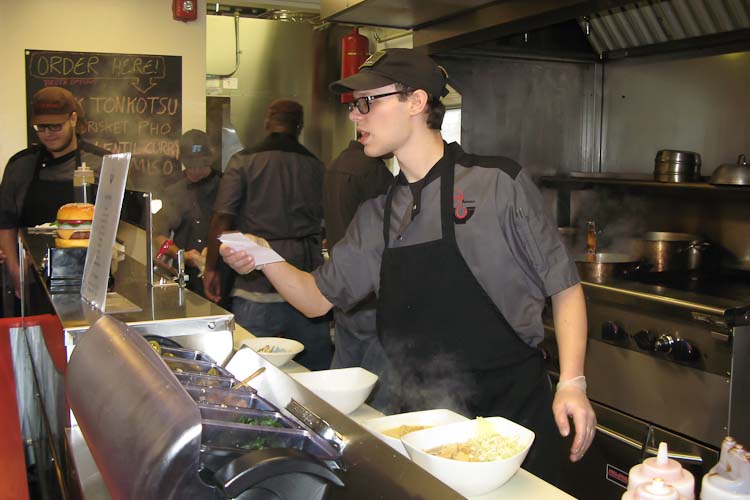Battle Creek Unlimited loans will help small businesses during virus related economic emergency
Battle Creek Unlimited has set up a fund for low-interest rate loans to help small businesses survive as customers are asked to stay in their homes as COVID-19 spreads.
During the 28 years that Clara’s on the River restaurant has been open, it has been the “go-to” place for Battle Creek area residents to celebrate major milestones, holidays and each other.
On Tuesday (March 24), Clara’s owner Ross Simpson made the difficult decision to temporarily shutter the restaurant even though he had just received a $50,000 loan, the maximum amount available, from an emergency fund established by Battle Creek Unlimited.
“We decided to shut it down,” Simpson said Wednesday morning (March 25). “We’re going in today to button up the kitchen. The safety of our kitchen staff and guests is our primary concern.”
Clara’s, like so many other local eateries in Battle Creek, had been offering drive-thru pickup and delivery after the first wave of restrictions from state officials called for limits on the number of individuals who could gather in one place. When Governor Gretchen Whitmer announced a Shelter-In-Place order, which went into effect at midnight on Tuesday, the restrictions tightened forcing non-essential businesses and other organizations to close temporarily.
Although some Battle Creek-area restaurants, coffee houses, and bars remain open with a drive-thru and delivery options, Simpson says he thinks he is making the best decision for now.
One week ago, Clara’s began offering the drive-thru and delivery option. Then the majority of the restaurant’s 52 employees were gradually and temporarily let go because without the dining-in option there was no need for hostesses, waitstaff, bussers, or bartenders.
Prior to the decision to close the 11,000-square-foot establishment, Simpson says he had “been trying to make hours available to anyone interested, but certain functions don’t work well for that. We had to lay off all of our dishwashers, waitstaff, hostesses and bus persons. Some stayed and some decided that they’d be better off on unemployment.”

As of Monday, a dozen or so of his employees were still actively working shifts, in addition to a seven-person management staff that included Simpson.
He used the loan from BCU to make payroll one last time. That was on Friday when he thought there was still an opportunity to offer some type of foodservice.
Joe Sobieralski, President and CEO of BCU, announced the BCU COVID-19 Emergency Loan Fund on March 20. Money to seed the $500,000 loan fund came from a Direct Investment Fund which is a revolving loan fund managed by BCU.
When Gov. Whitmer issued an Executive Order on March 16 that prohibits bars, restaurants, and coffeehouses from operating on-site service it effectively forced many of these businesses to close immediately. However, those that could, began offering the drive-thru/delivery options.
The day after that Executive Order was issued, Sobieralski says he mobilized his staff and began discussions with BCU board and committee members all of whom agreed that, “We’ve got to do something now,” Sobieralski says.
“We had this all set and wrapped up within 48 hours and that included a committee meeting vote and a board vote.
The fund is designed to get dollars and resources into the hands of the city’s most vulnerable businesses, the ones that are being most impacted by the order to close. Eligible businesses are defined as “small food and beverage” with priority given to those in the city of Battle Creek.
Among the requirements to qualify: applicants must report annual revenues of less than $2.5 million and must be able to demonstrate that they provided dine-in service prior to the executive order.
The goal of the emergency fund is to help businesses maintain payroll and workforce expenses. The funds can also be used for expenses that could have been paid if the executive order had not been issued.
Sobieralski says he began reaching out to businesses while final details of the fund were being worked out. One of his first calls was to Clara’s owner, Simpson, who says Sobieralski was “fantastic” and the loan was crucial.
“We had a discussion about it late Wednesday night. Thursday I was working on the paperwork and Friday morning we received approval and they transferred $50,000 into our bank account that same day,” Simpson says. “I can’t tell you how critically important that money was. Friday was a $35,000 payday of which we were underwater slightly. I was concerned about sending out payroll taxes, which were due, and was able to do that because of this loan.”
Simpson has also applied for a loan through the U.S. Small Business Administration, but says “that’s been pending for a few weeks now. I’m sure I’m one of the millions of applications.”
On March 19, Gov. Gretchen Whitmer announced that the U.S. Small Business Administration approved her request for a statewide Economic Injury Disaster Loan declaration, opening the opportunity to small businesses to access low-interest loans from the federal government. But, Sobieralski says he and other BCU leadership recognized the need to provide some type of immediate relief at the local level.
“Economic development is focused on attraction and retention. We shifted our gears dramatically,” he says. “We knew we needed to get down to the micro-issues that are affecting everyday folks. Our business outreach and attraction efforts are pretty much on hold so we decided to triage what’s going on locally.”
Sobieralski says the loan fund is designed to help these businesses maintain employment and have some operating revenue designed to get them past the next eight weeks. It offers a very low-interest rate with no payments for the first six months.
A total of nine businesses have applied for some portion of the loan funds. By week’s end, Sobieralski says, he expects to have made about $350,000 in loans and is anticipating the addition of more funds to cover more requests.
“We’re looking to expand the fund and the scope as a result of this latest Executive Order,” he says.
The announcement of the BCU loan fund included a request to applicants to ask for only what they really need to see them through this time of upheaval and uncertainty.
“We’re asking folks to be judicious and only take what they need because then we can make it stretch farther,” Sobieralski says.

Peecoon Allen, the owner of Umami Ramen, says when Sobieralski reached out to her a few days prior to the announcement of the fund, she decided not to apply because she wanted to leave the money for those businesses that really need it.
“I really, really love Joe’s thoughts and direction and I appreciate his support,” Allen says. The amount of business they have generated each month so far has put them in a good position. “We’ve been blessed. We’re still debt-free from when we first started to now.”
However, she will soon be accruing some debt with the opening of a new location for her restaurant in a stand-alone building at 215 W. Michigan, site of the former Taste of India restaurant. She also recently closed the original Umami Ramen location at 78 Calhoun Street because of the increasing restrictions resulting from efforts to contain the spread of the Coronavirus.
Construction work at the West Michigan location is continuing and is expected to cost about $650,000. A $250,000 grant awarded by BCU to Umami Ramen through the downtown Real Estate Improvement Fund, will leave Allen with $400,000 to pay off. She says she also will be spending $25,000 to obtain a liquor license and anticipates spending more than $180,000 for restaurant equipment, furniture, and inventory, among other things.
Even though the funds from BCU would have been a low-interest loan, she says she didn’t feel comfortable accruing any additional debt.
“It’s a great avenue for those who need it,” she says of the BCU loan fund.
For business owners like Simpson, it was a lifeline at a slow time of the year when cash flow is traditionally tighter.
“I don’t know what I would have done without it,” Simpson says. “I’m another $50,000 in debt, but I care intensely about my employees and my business. If I have to borrow money, this is the best out there.”
His first BCU loan payment isn’t due until Nov. 1 and he hopes that his SBA loan application will be approved. Regardless, he says Clara will re-open once the life settles into a new sense of normal.
“We enjoy what we do immensely and we’re very protective of it. We’re fighters and we’re going to beat this thing too,” Simpson says. “We’re going to hunker down and make sure people have their jobs to come back to.

















